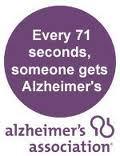If you have not already come into contact with someone suffering from Alzheimer’s disease, it will only be a matter of time before you do as there are more and more cases diagnosed every day.
Please don’t ignore that person. Don’t look the other way because you feel uncomfortable. The first thing to do is to interact with the person who is ill. That person’s memory might not be as accurate as yours but he/she is a human being and deserves to be treated as such. Give him/her your attention and the respect he/she deserves. By staying away, all you are doing is insulting a friend or a relative. When you arrive, you can shake his/her hand or put an arm around the person’s shoulders.
Some people tend to talk down to an ill person , someoneone in a wheelchair or a person using a walker, in a sort of sing-song voice, the way a person who does not understand children may do. How would you feel if someone did that to you? I am sure that your reaction would be to move away from your visitor. Remember that someone suffering from Alzheimer’s is an adult so please treat that person accordingly.
One of the most precious things this person has left is his/her name, so instead of using a term of endearment that could sound rather insincere, do use the person’s name.
Someone suffering from Alzheimer’s is not confused all the time, so please don’t assume that he/she is. Of course this depends on how far the illness has progressed.
The worst thing you can do is to quiz the patient. ‘Do you remember me? I was here only last week, you know?’ Or, ‘what did you have for lunch? Did you enjoy it?’ These questions are not beneficial and only serve to increase the person’s anxiety and stress the fact the his/her memory is not what it used to be.
For goodness sake refrain from asking the caregiver questions about the person while he/she is right there, sitting and staring at you. You have no idea what he/she can absorb or not and it is downright insulting and very rude to do this. I have noticed that some doctors do this when on their morning rounds in the hospital … they talk in medical terms as though the patient is a dummy and fail to explain or ally the person’s fears. Couldn’t they visit the patient, examine him/her, read the computerized information and then disuss it in the corridor with whoever is with him that morning?
Try not to focus on what the person is now unable to do. Rather pay compliments like … you probably still walk further than I do, or would you help me set the table as you are so artistic. Focus on the person’s other skills which will make him/her feel good even if the person is unable to show it.
Please don’t stop visiting simply because the person didn’t seem to remember you. He/she is a person and needs company. We don’t know what his/her inner feelings are but he/she has the same feeling that you do. The emotions that you arouse in that person will remain long after you have left and gone home.
If you are still unsure of how to behave to this person, ask yourself the following question; “How would I feel if I were in his/her position?”

